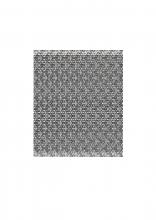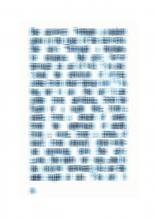
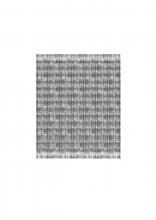
My Poem Brut commission was initially inspired by CK Williams’ poem The Critic. In this poem we see a man sitting at a desk at the same hour, in a public library, day after day returning his pen again and again to the top left-hand margin of a battered loose-leaf book. We watch this man trace line after line, his pen over articulating the groves and furrows that mark out the well-worn track from left to right, from the first word to the last, hesitating briefly at the bottom of the page, only to return, again and again, to the top left hand margin, same page, same routine, hour after hour, day in and day out, week after week, black ink etched into the softened white paper, each line gradually misaligned, the space between them slowly diminishing beneath the layers of ink, gradually accumulating, until any evidence of that track disintegrates. Far from clarifying the facets of struck and cut type, the unforeseen consequence of this man’s compulsive desire to describe the nuance of each letter clearly, to duplicate every detail distinctly, to omit nothing, complexifies our ability to comprehend what has actually been written.
What interested me about the ink-stained palimpsest that the man in Williams’ poem so attentively transcribes, is that it not only resists the conventional codes of legibility, but that the processes involved in making it potentially invite an alternative kind of readability, one that does not appeal solely to the intellect. The words herein are woven together like cloth, a homespun yarn without a narrative or plot, a printed text(ile) lodged within the texture of the page, the familiar form of things undone, or rather redone a little differently. What comes to the fore in Williams’ poem are the material properties of the printed page.
Using a process of cutting, erasing, turning, repeating and overprinting a single page of writing, each piece made for my Poem Brut commission translates text into text(ile), thereby forcing the act of reading itself to become a physical, tactile experience.
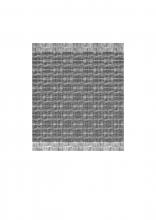
In 2015 I completed a practice-based PhD, at Chelsea College of Arts, my practice being writing. My thesis focused on the ways in which film has been used by novelists as a resource to transform their writing practice, and on how the non-conventional writing techniques generated by film could, in turn, produce alternative forms of readability. During the course of my research visual techniques, which were derived from the cinema, such as the cut, the close-up and the dissolve, were used to alter and reconfigure the spatial logic of the conventional printed page. However, although each piece of writing produced during the course of this project aimed to disrupt the familiar circuits of recognition and communication that keep language tied to its informative role, each text was, in itself, still legible.
In 2016 I submitted some visual writing/poetry to Steven at 3AM magazine, which he thankfully published as part of his Poem Brut series in 2017. This was an important turning point for me. In Poem Brut I found a context within which I felt free to experiment with writing as a material practice, a context within which I was able to explore the familiar spatial logic of the standard printed page without the need to observe the protocols of legibility, such as, sentence structure, capitalisation, punctuation, the size of the type, and the width of margins, the kind of typographical rules and regulations that guard against the unexpected intervention of chance. (Perhaps this is a good place to say that I am only referring to Western European typographical conventions). Unlike my PhD, Poem Brut has encouraged me to embrace and incorporate accidents, mistakes, amendments, misprints, and misalignment, to use techniques such as cutting, turning, repeating, erasing, and overprinting as a means by which to draw attention to, and sabotage our deeply engrained habits of reading, writing, and thinking.
For me, Poem Brut is inventive at the same time as it is disruptive, it embraces notions of illegibility and illiteracy as a means by which to liberate us from the limitations imposed on us by conventional reading practice. As we strain to see through layer upon layer of overwriting in an attempt to decipher an illegible scribble or scrawl, we attend to the material qualities of the paper itself, to its grain, weight and flexibility, to its susceptibility to marking, to its status as an object, or artefact, replete with its own characteristics. Mangled and tangled barely recognizable writing modified and unspun, we apprehend rather than comprehend this vocabulary of incoherence, we stumble, we hesitate, we stammer. The act of reading made physically palpable.
As you can see, my work is not political, at least not in the usual sense of the word, it does not carry a message because it does not reduce writing, or language, to its communicative function, but, in these turbulent political times, I believe that Poem Brut offers a means by which to resist the idea that there is one way to speak, think, or write. It not only challenges our idea of what reading, writing, and thinking are, but, more importantly, of what they are capable of becoming.
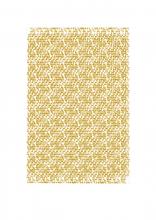
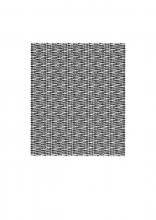
Imogen Reid completed a practice-based PhD at Chelsea College of Arts, her practice being writing. Her thesis focused on the ways in which film has been used by novelists as a resource to transform their writing practice, and on how the non-conventional writing techniques generated by film could, in turn, produce alternative forms of readability. Among the writers explored during the course of her research were: William S. Burroughs, Alain Robbe-Grillet, Marguerite Duras, Don DeLillo, and Michel Butor. Her work has appeared in: Hotel Magazine, LossLit, gorse journal, Zeno Press Grey Anthology, Elbow Room, Sublunary Editions, RIC Journal, Not Your Best, IceFloe Press, ToCall Magazine and 3AM Magazine. She has participated in Steven J. Fowler’s Poem Brut events and exhibitions. She has a pamphlet with Gordian Projects.
